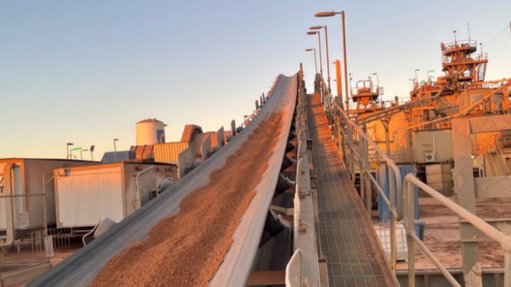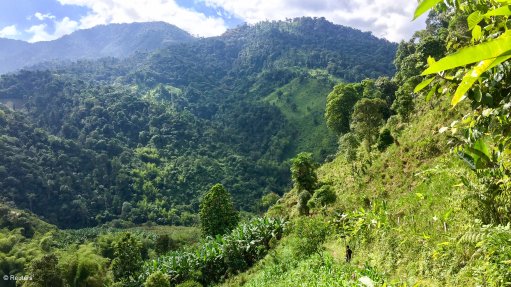Company highlights importance of water reuse for Namibian mining industry
Water recycling is of the utmost importance in the Namibian mining industry, as the country is severely affected by drought and shortages of potable water, says water and chemical treatment solutions provider Aqua Services & Engineering (ASE) MD Chris Stöck.
The company, which is the Namibian subsidiary of Veolia Water Solutions & Technologies South Africa, provides services in potable water supply, industrial water supply, water and wastewater treatment, water recycling and water use in mining processes, and has been active in the country for 20 years.
“In the central coastal area, there is a significant shortage of potable water, as the aquifer, which feeds the mining area, Swakopmund and Hentiesbaai, has not had an inflow of water for the past few years and is, therefore, under strain. Compounding this problem is the old piping infrastructure.
“The extraction permit for the aquifer, which is currently at nine-million cubic metres a year, was supposed to be reduced to 4.5-million cubic metres a year on November 1, 2012, but this has been extended to November 1 this year. When this is put into place, the amount of available water in the area will be substantially reduced,” says Stöck.
He explains that ASE plans to focus on desalination solutions for the mines in this area to generate additional water supply.
Stöck adds that the company also offers a number of patents and systems which allow water use in the mining process to be improved, from the Veolia group.
“The Veolia Actiflo technology is a high-rate clarifier which has been used in industrial, municipal and wastewater treatment for many years. The Multiflo technology allows for better separation between sludge and water going to the mines’ tailings dams, enabling the client to reuse that water in mining processes instead of leaving it to evaporate from the tailings dams.
“We are implementing these technologies in the country on a trial basis and hope that they will quickly regain popularity,” he explains.
Stöck notes that ASE is also considering ways in which mines can reuse their normal wastewater or sewage after it has been treated, using a fixed-film trickling filter system which allows treated water to be reused in the mining process. This has already been implemented at two uranium mines in Namibia and in mines in the Democratic Republic of Congo, Tanzania and Guinea.
He says the company developed this technology to be compact, with pumps as the only mechanical items to transfer the water within the system.
“It is easy to maintain, as most maintenance teams know how to maintain pumps, compared with other biological systems and processes that need mechanical blowers and compressors.
“The mining sector constitutes 30% to 40% of the company’s total income, making it important that we stay abreast of the latest technologies to service the industry. Many mining companies in the country are international and bring in their own preferred international suppliers, but it is still up to local companies, such as ASE, to service them,” Stöck states.
Challenges
Stöck notes that working in Namibia can be challenging at times, especially in terms of logistics and employing skilled personnel.
“Projects often require us to travel large distances to remote areas, which can result in huge time delays if you do not have extremely accurate planning and logistical support in place. It is also challenging to find qualified personnel in the country,” he explains.
Despite these challenges, Stöck says the company plans to strengthen its position in the mining industry through growing and establishing a larger presence in the mining industry this year.
“The Namibian mining indus- try will continue to grow at a slow, but steady pace. It will also continue to diversify. Historically, the country was mainly a diamond miner, but we are seeing developments in uranium, gold and rare-earth minerals.
“ASE plans to make the latest technologies in wastewater treatment and reuse available to face the challenge of the water shortage in the country, as this is affecting all industries,” he concludes.
Article Enquiry
Email Article
Save Article
Feedback
To advertise email advertising@creamermedia.co.za or click here
Announcements
What's On
Subscribe to improve your user experience...
Option 1 (equivalent of R125 a month):
Receive a weekly copy of Creamer Media's Engineering News & Mining Weekly magazine
(print copy for those in South Africa and e-magazine for those outside of South Africa)
Receive daily email newsletters
Access to full search results
Access archive of magazine back copies
Access to Projects in Progress
Access to ONE Research Report of your choice in PDF format
Option 2 (equivalent of R375 a month):
All benefits from Option 1
PLUS
Access to Creamer Media's Research Channel Africa for ALL Research Reports, in PDF format, on various industrial and mining sectors
including Electricity; Water; Energy Transition; Hydrogen; Roads, Rail and Ports; Coal; Gold; Platinum; Battery Metals; etc.
Already a subscriber?
Forgotten your password?
Receive weekly copy of Creamer Media's Engineering News & Mining Weekly magazine (print copy for those in South Africa and e-magazine for those outside of South Africa)
➕
Recieve daily email newsletters
➕
Access to full search results
➕
Access archive of magazine back copies
➕
Access to Projects in Progress
➕
Access to ONE Research Report of your choice in PDF format
RESEARCH CHANNEL AFRICA
R4500 (equivalent of R375 a month)
SUBSCRIBEAll benefits from Option 1
➕
Access to Creamer Media's Research Channel Africa for ALL Research Reports on various industrial and mining sectors, in PDF format, including on:
Electricity
➕
Water
➕
Energy Transition
➕
Hydrogen
➕
Roads, Rail and Ports
➕
Coal
➕
Gold
➕
Platinum
➕
Battery Metals
➕
etc.
Receive all benefits from Option 1 or Option 2 delivered to numerous people at your company
➕
Multiple User names and Passwords for simultaneous log-ins
➕
Intranet integration access to all in your organisation


















